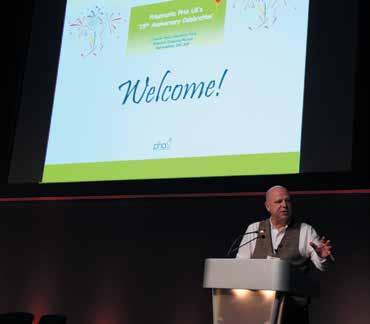
6 minute read
Brothers and sisters
from Emphasis Winter 2015
by PHA UK
Supporting brothers & sisters
When a child or young person is diagnosed with PH it has an impact on the whole family. The child’s brothers and sisters may be affected in all sorts of ways. Here paediatric clinical psychologist at Great Ormond Street Hospital Vicky Kelly talks to Steph Pollard about siblings and considers some ways to support them too.
Having a brother or sister with a chronic condition like PH can affect a child in many ways and it is normal for a young person in this situation to experience a wide array of difficult and conflicting emotions.
They may feel worried and sad about their sibling’s illness but also jealous of the ‘extra attention’ they perceive their sibling to be getting and angry about how disruptive the illness is to their family’s life.
Research suggests that these children might be, therefore, more vulnerable to developing emotional difficulties such as anxiety or depression and also behavioural difficulties, as they try to elicit more attention from their parents and express their anger through tantrums.
However, it is also important to note that some siblings develop stronger resistance to emotional difficulties later on in life because they have had to develop coping strategies to manage difficulties earlier than they might have done otherwise. Thus they can become more emotionally resilient adults.
Vicky says: “One of the most important things for a parent to do is let their other child know that every feeling they have is ‘normal’ and to provide a safe space for these emotions to be talked about in order to help make sense of them.
“Siblings often worry about burdening their parents further or feel ashamed about what they think or feel in relation to their brother or sister. It is perhaps even more important for parents to continue to regularly let them know how unconditionally they are loved no matter what they say or do and that any feeling is okay and can be talked about in an open and supportive way.”
Lots of different things can have an impact on brothers and sisters of a child with PH. Regular trips to hospital with their family and witnessing their sibling waiting for and under-going tests and treatments can be just as traumatic for brothers and sisters as they are for the child with PH.
The, often unavoidable, time out of normal life can also disrupt the development of friendship groups for siblings, as well as the child with PH, which can lead to difficulties with their peer group.
On the other hand, if they don’t go with their family on hospital visits, they can feel left out, and might mistakenly think they are missing out on a ‘fun’ day out in the city. Not knowing what the visit actually involves, can also lead to further anxiety as, depending on their age, they might imagine something far worse happening to their brother and sister at hospital.
One of the most difficult things for parents to manage is dividing their time and attention between all their children when one is ill. Good intentions to spend more time with the other children can end up not happening, through no fault of the parent, as the demands of everyday life and managing PH, dominate the family’s life.
Vicky works as part of the multidisciplinary PH team at GOSH and says that in assessing the emotional support needed by any young person with PH, she always tries to involve the whole family in initial meetings. “It is very important to assess all the potential needs for support. We work collaboratively with families and local services to try and coordinate support for the whole family where needed.”
How to support siblings of children with PH Vicky Kelly shares some strategies and ideas
> Keep your child in the loop. Explain what is happening, in a way that is appropriate to their age and level of understanding, and involve them in discussion. It may be appropriate to take siblings along to PH appointments as it can be good for brothers and sisters to see the situation is under control, people are caring and the hospital is a friendly place. But make sure you talk though any concerns they might have about doing this first and don’t push them to do anything they do not want to do.
> Plan for special one-to-one time with all your children as routine. Even if it is just ten minutes a day after meals. Or it might be an extra bedtime story or another special activity you always do together. These dedicated moments when your focus is just on them can be extremely valuable for their self-esteem and a great opportunity to let them know how much you love them and enjoy spending time with them. They can also be key times to talk though feelings.
> Encourage friends and family to remember all your children. If they do bring gifts and treats for your child with PH, encourage them to include all of them. If they talk a lot about your child with PH, gently try and steer the conversation back to include all your children.
> Use a ‘worry box’ in to which your child can post little notes about things they are worrying about. This can then be opened at a set time each week and the ‘worry notes’ can be talked through. This can be useful to capture and acknowledge anxieties as they happen and then put them to one side to be dealt with at a safe, pre-arranged time. > Encourage your child to keep a diary or scrap book. Younger children can collect bus tickets and pictures of hospital visits and look back on these things as they talk with their parents about the visit. Older children can use the diary as a safe place to express their feelings and reflect on their experiences.


> Develop a culture of openness. Talk about your feelings and encourage your child to talk about theirs. Give lots of reassurance that all their feelings and emotions are normal, okay to have and you can deal with them together. And let them know you love them no matter what.
> Make sure school is aware that your child has a brother or sister with a chronic health condition. And talk about how this may affect them. Parents often liaise with school about their child with PH but it is important to do the same for siblings too.
> Set and maintain boundaries around acceptable behaviour. There can be a tendency for some parents to make allowances for brothers’ and sisters’ disruptive behaviour because they feel they have so much to put up with already, but all children need clear boundaries. Be clear about what you expect of their behaviour – and deal with their emotional needs separately.
> Use puppets and soft toys. This can be an excellent way to encourage younger children to talk about their feelings in a non-threatening way. Play, listen and reassure through play. > Remember support is out there. If these ideas do not help on their own, contact your child’s medical team for further assistance..
Vicky would like to acknowledge colleagues, Jacqueline Blyth and Hilary Griggs for some of the ideas talked about in this article. Research referred to in this article: Alderfer, M. A., Long, K. A., Lown, A., Marsland, A. L. Ostrowski, N. L., Hock, J. M., & Ewing, L. J. (2009). Psychosocial adjustment of siblings of children with cancer. A systematic review. Psycho-oncology, 19, 789-805; And, Houtzager, B. A., Oort, F. J., Hoekstra-Weebers, J. E. H. M., Caron, H. N., Grootenhuis, M. A. & Last, B. F. (2004). Coping and family functioning predict longitudinal psychological adaptation of siblings of childhood cancer patients. Journal of Paediatric Psychology, 29, 591-605










